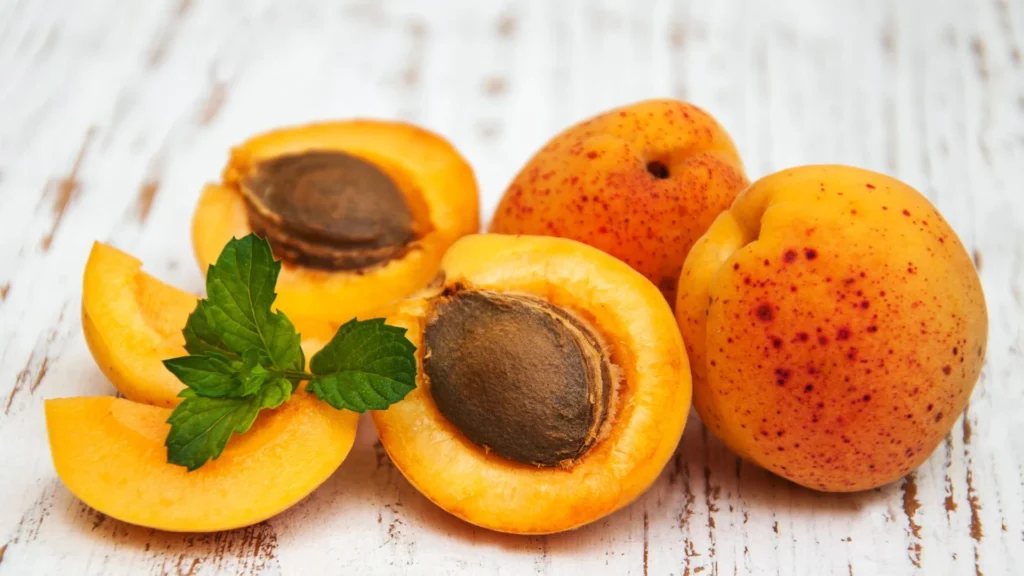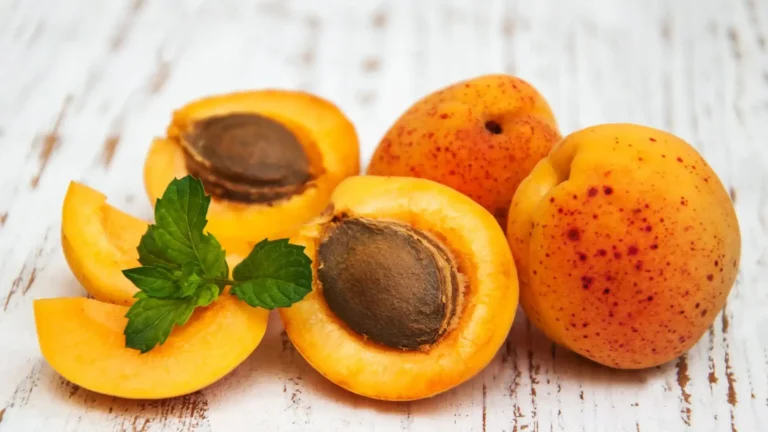Two to three apricots in a day qualify as a good serving of the fruit in general. This amount provides a healthy dose of vitamins, particularly A and C, fiber, and antioxidants without adding excessive sugar to your diet.
Determining how many apricots you should eat in a day depends on your dietary needs and health goals. Eating apricots in moderation balances nutritional benefits while preventing overconsumption of sugar.
Apricots are versatile, enjoy them fresh, dried, or as part of recipes. Listen to your body and adjust your intake based on your specific health requirements and dietary preferences.
Nutritional Profile of Apricots
The nutritional profile of apricots is rich and diverse, offering a variety of health benefits. Apricots are a good source of vitamin A, which is crucial for eye health, and vitamin C, known for its antioxidant properties and immune support. They also contain fiber, which aids in digestion and helps maintain a healthy gut. Additionally, apricots provide potassium, essential for heart health and muscle function, and some iron, which is vital for blood health.
The antioxidants in apricots, including beta-carotene and lutein, protect cells from damage and reduce the risk of chronic diseases. The fiber content not only supports digestion but also contributes to weight management by promoting feelings of fullness. Furthermore, the potassium in apricots can help manage blood pressure levels, while the iron content supports energy levels by improving oxygen distribution in the body.
Incorporating apricots into your diet can enhance your nutritional intake and support overall health, making them a valuable addition to a balanced diet.
Understanding Serving Sizes
Understanding serving sizes is key to incorporating apricots into your diet effectively. A serving of apricots typically consists of two to three small to medium fresh apricots. This is equivalent to about one cup of sliced apricots or roughly 150 grams.
In comparison to other fruits, a serving of apricots is similar in weight to a medium apple or banana but offers a lower calorie count and sugar content, making it an excellent alternative for individuals who want to monitor their sugar intake.
When considering dried apricots, the serving size reduces to about one-quarter cup, due to their decreased water content and higher concentration of sugars and calories. This makes them more calorie-dense than fresh apricots. It’s important to adjust portion sizes accordingly, especially when comparing fresh to dried fruits.
By understanding what constitutes a serving of apricots and comparing it with other fruits, you can better plan your meals and snacks to ensure a balanced and nutritious diet.
Recommended Daily Intake
The recommended daily intake of fruits, according to health authorities, is at least 2 cups for adults. This guideline serves as a foundation for a balanced diet, offering a range of essential nutrients and fiber. For apricots specifically, incorporating two to three fresh apricots into your daily fruit intake is a healthy and beneficial choice. This amount provides a substantial portion of the daily vitamin A and C needs, without exceeding sugar and calorie limits.
For individuals with specific dietary needs or health conditions, such as diabetes, the intake of apricots should be adjusted to fit within their overall dietary plan, focusing on the fruit’s sugar content.
Children and older adults may also have different nutritional requirements, making it important to consider age when determining the appropriate serving size. A pediatrician or dietitian can provide personalized advice.
In essence, while the general recommendation for fruit intake is broad, tailoring your apricot consumption to your personal health needs and dietary goals ensures you gain the maximum benefits from this nutritious fruit.
Benefits of Eating Apricots
The benefits of eating apricots are extensive, impacting various aspects of health positively. Apricots are renowned for their high vitamin A content, a nutrient essential for eye health. This vitamin, along with beta-carotene, helps protect the eyes from age-related damage and supports good vision. The fruit’s vitamin C content is crucial for skin health, promoting collagen production and reducing the effects of aging.
Apricots are also a good source of dietary fiber, which enhances digestive health. The fiber aids in maintaining a regular bowel movement and can help prevent constipation. Moreover, the potassium in apricots contributes to cardiovascular health by regulating blood pressure levels.
Scientific studies support these health benefits. Research has linked the consumption of fruits rich in vitamins A and C, like apricots, with a reduced risk of vision and skin-related issues. Additionally, the dietary fiber in apricots has been associated with improved digestive health in numerous dietary studies.
Nutrition experts often recommend apricots as part of a balanced diet due to their low-calorie yet nutrient-dense profile. Including apricots in your daily diet can thus support overall health, from enhancing eye and skin conditions to promoting digestive and cardiovascular well-being.

Potential Risks and Considerations
The potential risks and considerations associated with eating apricots, while generally low, are important to understand. Consuming too many apricots can lead to an excessive intake of sugar, particularly in their dried form, which is higher in sugar and calories. This could pose a concern for individuals managing their blood sugar levels, such as diabetics, who need to monitor their carbohydrate intake closely.
Apricots also contain substances that might trigger allergies in some individuals, though such reactions are rare. Symptoms of an apricot allergy can include itching, swelling, and respiratory issues.
For pregnant women, apricots are generally safe and beneficial due to their vitamin and mineral content. However, moderation is key, as with all foods. The high fiber content, while beneficial for digestive health, can cause gastrointestinal discomfort if consumed in large amounts.
Special considerations should also be made for individuals with kidney issues due to the potassium content in apricots. High potassium intake can be harmful to those with compromised kidney function, who may need to limit their consumption of high-potassium foods.
Therefore, while apricots are a nutritious addition to most diets, it’s crucial to consume them in moderation, considering individual health conditions and dietary needs.
Incorporating Apricots into Your Diet
Incorporating apricots into your diet can be both delicious and nutritious. For a creative twist, add fresh or dried apricots to your morning oatmeal or yogurt for a natural sweetness and texture. Apricots also make a great addition to salads, giving them a fresh, fruity flavor.
For snacks, you can try apricot bars or blend apricots into smoothies for a vitamin-packed drink. Baking enthusiasts can incorporate apricots into muffins, cakes, or tarts, providing moisture and a sweet-tart flavor profile.
When selecting apricots, look for fruits that are firm yet slightly soft to the touch, with a rich, orange color that indicates ripeness. Avoid those with bruises or that are overly hard. To store apricots, keep them at room temperature until they ripen, then move them to the refrigerator to slow down the ripening process. Fresh apricots can last in the refrigerator for up to a week, while dried apricots should be stored in an airtight container in a cool, dark place.
By incorporating apricots into different meals and snacks, you can enjoy their health benefits in a variety of tasty ways. When properly selected and stored, apricots can be a delightful addition to your diet, enhancing your meals with their sweet, tangy flavor.
FAQs on How Many Apricots Should I Eat in a Day?
Is it safe to eat apricot seeds every day?
Eating apricot seeds in small amounts is considered safe for most people, but caution is advised. Apricot seeds contain amygdalin, which can convert into cyanide in the body. Consuming high amounts can lead to cyanide poisoning. It’s recommended to limit intake and consult with a healthcare provider for personalized advice.
What is the best way to eat apricot seeds?
The best way to eat apricot seeds is in moderation and after consulting with a healthcare professional. Some prefer to crack the seeds open and consume the kernel inside, often no more than one or two seeds per day. Others use ground seeds in small quantities as a supplement. Always start with a very small amount to see how your body reacts.
What do apricot seeds do for the body?
Apricot seeds are believed to have health benefits due to their vitamin B17 (amygdalin) content, which some alternative medicine practitioners suggest may have anti-cancer properties. However, scientific evidence supporting these claims is limited, and the potential risk of cyanide exposure from amygdalin should not be overlooked. Apricot seeds also contain healthy fats, fiber, and iron, contributing to a balanced diet when consumed in safe, small quantities.








